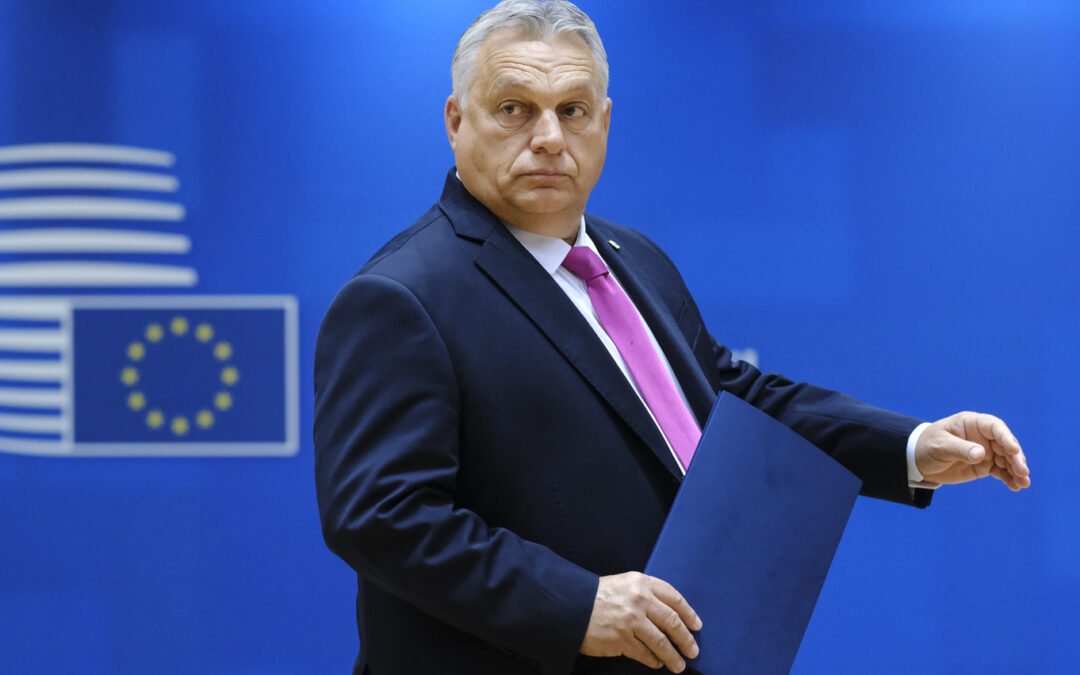A Polish deputy foreign minister has suggested that Hungary could leave the EU and NATO and instead “create a union with Putin and authoritarian states”.
His remarks came in response to a speech on Saturday by Viktor Orbán in which the Hungarian prime minister criticised the West, praised Russia, and accused Poland of “hypocrisy” for “morally lecturing” Hungary over relations with Moscow while continuing to buy Russian oil.
Polak, Węgier, dwa bratanki – lengyel, magyar két jó barát.
Hogy is mondta Orbánról Hofi? Megalapítja majd a visegárdi egyeket. De Hofi nem tudhatta hogy minden majd az oroszbarátságról szól és van egy Fico aki szívesen nyal Putyin segget Orbánnal közösen. pic.twitter.com/5EhFxzV5xu— Hunique (@Skorpiooh) July 27, 2024
During a speech at an event for the ethnic Hungarian minority in Romania, Orbán discussed the war between Russia and Ukraine. He criticised the “weakness” of the West, accused EU leaders of “following US foreign policy unconditionally”, and praised Russia’s “hyper-rationality” and anti-LGBT+ “soft power”.
Orbán declared that “there is no longer a Paris-Berlin axis”, referring to the traditional Franco-German leadership of Europe. “It is replaced by [a] London-Warsaw-Kyiv [axis].”
“Public opinion punishes German and French policies that do not meet the interests of the US,” he continued. “Poland could be the new headquarters of the US in Europe. The goal is to weaken Russia. That’s why Poland gave up the V4 [Visegrad Group] axis.”
Orbán then accused Poland of “hypocrisy”, noting that they have regularly criticised and “morally lectured” Hungary over its business ties to Russia while “at the same time they are doing business with the Russians”. He claimed that Poland is indirectly buying Russian oil and using this to “run their economy”.
Sorry to interrupt your reading. The article continues below.

Notes from Poland is run by a small editorial team and published by an independent, non-profit foundation that is funded through donations from our readers. We cannot do what we do without your support.
The Hungarian prime minister’s speech prompted an angry reaction from Poland, with deputy foreign minister Władysław Teofil Bartoszewski telling the Polish Press Agency (PAP) that “we do not do business with Russia, unlike Prime Minister Orbán, who is on the margins of international society – both in the EU and NATO”.
Orbán’s speech was “an attack on Poland, the US, the EU and NATO,” said Bartoszewski. “I don’t really understand why Hungary wants to remain a member of organisations that they don’t like so much and that supposedly treat them badly.”
“If you don’t want to be a member of a club, you can always leave,” continued the Polish minister. “Why doesn’t he [Orban] create a union with Putin and some authoritarian states of this type?”
Polish diplomat: Why doesn't #Orban create a Union with #putin and some authoritarian states of this type?https://t.co/FaKav1sTOl
— Українська Трибуна (@U_Tribune) July 28, 2024
That in turn prompted a response from Hungarian foreign minister Péter Szijjártó, who said that Bartoszewski’s “reaction proves that the truth hurts”.
“While the current Polish government judges and accuses us because we import petroleum from Russia…if we take a good look at the list of buyers of one of the largest Russian oil companies, we will certainly find the Poles there as well,” continued Szijjártó. “You shouldn’t be hypocritical and accuse others.”
Szijjártó did not offer any details of what he was referring to. Poland ended almost all of its Russian oil imports in 2022 after the full-scale invasion of Ukraine. However, Polish state energy giant Orlen has continued importing significant quantities of Russian oil to its refineries in the Czech Republic.
In response to Szijjártó’s remarks, Krzysztof Brejza, an MEP from Poland’s main ruling Civic Platform (PO) party, accused the Hungarian foreign minister of “lying publicly, looking for arguments to defend the dictator Orban”.
🇭🇺 FM Szijjártó sharply responded to the Polish Foreign Affairs State Secretary's reaction to @PM_ViktorOrban's speech at Tusnádfürdő, highlighting the truth behind the Hungarian saying: "The truth hurts."
🗨️ "With the intention of preserving the Polish-Hungarian brotherhood, we… pic.twitter.com/z5enR84GtB
— Zoltan Kovacs (@zoltanspox) July 28, 2024
Poland and Hungary have regularly clashed over their differing approaches to the war in Ukraine, with Warsaw among Kyiv’s closest allies but Orbán maintaining friendly ties with Moscow.
Earlier this month, Polish Prime Minister Donald Tusk mocked Orbán’s “peace mission” to Moscow, asking: “Is there anyone who feels safer after Victor Orbán’s exchange with Vladimir Putin on the ‘post-war European security architecture’?”
Shortly afterwards, it emerged that Hungary has been blocking EU funds earmarked for Poland to compensate for military aid Warsaw has provided to Ukraine.
Hungary is blocking €2bn of EU funds earmarked for Poland to compensate for military aid Warsaw has provided to Ukraine.
Foreign minister @sikorskiradek says Hungary is behaving in an “unfriendly and hostile” manner towards Poland https://t.co/8QcyAseMvH
— Notes from Poland 🇵🇱 (@notesfrompoland) July 11, 2024
Main image credit: European Union

Daniel Tilles is editor-in-chief of Notes from Poland. He has written on Polish affairs for a wide range of publications, including Foreign Policy, POLITICO Europe, EUobserver and Dziennik Gazeta Prawna.



















